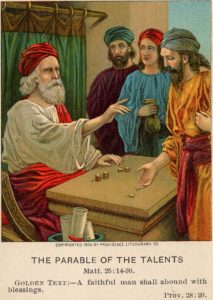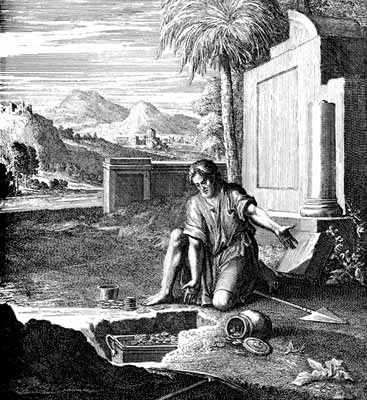 Since childhood, I’ve often puzzled over an element in Jesus’ Parable of the Talents.
Since childhood, I’ve often puzzled over an element in Jesus’ Parable of the Talents.
In the story, a rich man goes on a journey, but before he leaves he entrusts his property to his servants in varying degrees. Two of the three servants use the money as business investments and they add to their master’s wealth. One of the servants buries his money in the ground.
When the master returns, he is pleased with two of his servants, but he is very angry with the servant who buried his treasure. Listen to the words:
“[You] . . Evil and lazy slave. . . then you should deposited my money with bankers, and on my return I would have received money back with interest! Therefore take the talent from him and give it to the one who has ten.”
Admittedly, what I used to ponder wouldn’t have made a good sermon. I mean, we all have a good idea of what it means to be the first two servants. What I always wanted to know though, was how exactly one went about “depositing the money with bankers” in real life. What on earth did that mean?
It sounded like Jesus was giving a hint about what “bare minimum” looks like. That always puzzled me. It wasn’t like Him to suggest lukewarm. Thus you can see why a pastor might not choose this sermon title on his church sign: “How to live the Christian walk while giving the least possible to the Kingdom of God.”
When asked to write a post about how much giving $10 a month really can do, this parable rushed to my mind. Like the proverbial light bulb turning on, I saw how well that parable fit this question from Media Change.
 That servant had money in his hand. I can imagine him looking at the shiny coin trying to decide what to do.
That servant had money in his hand. I can imagine him looking at the shiny coin trying to decide what to do.
Burying it in the ground is about the same as investing all of your spare money into entertainment. After the credits role or the high score is achieved, it goes nowhere else. It’s done.
Had the servant walked across the street and handed it to the banker, it would have been used for something greater.
So what if the servant didn’t have the business skills like the other two! He didn’t need those skills if he invested it wisely. The important part of the story is that he had something to give—something to use.
Banks are trusted with deposits, both big and small, because they have the ability to grow that money into something more. Communities are established because of banks. Houses are built. Businesses are funded. The money is collected from all different sources with the intent of making it into something more.
It’s a lot like Media Change. True, ten dollars all by itself won’t go very far to fight world poverty. But when you combine it with the donations of others and it enables a documentary to be made to help stop Sex Trafficking, or it provides a ministry with a desperately needed website—that money will grow into something far more than its investor even knows.
Who knows! Maybe that community of people working together through the bank accomplished far more for the community than the first servant did by himself.
It is strange using that servant to blog about our ministry—after all, our entire life, whenever we hear that parable, we all know that we absolutely did not want to be that servant.
Yet the question remains—how many of us actually are?
Think of the identity of that servant. They weren’t rich (it was only one talent). They didn’t know what to do with it. (Again, it was only one talent.) So nothing of value was done with it. (Perhaps they only saw it as one talent—and not what it could be.)
Yet that one talent could have been used for something huge.
Maybe Jesus wasn’t giving us hint about how to live the “bare minimum,” but maybe He was reiterating the purpose of not serving self—even in the small things.
